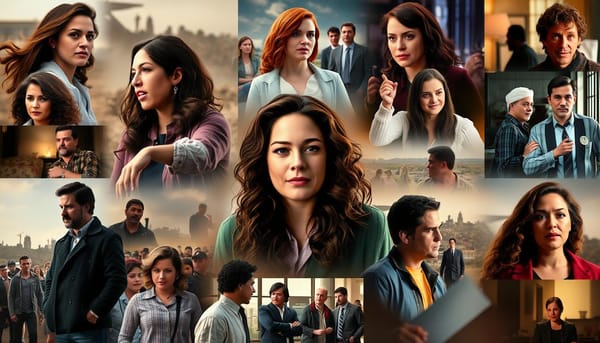Major Crimes: Delving Into the World of Law Enforcement

"Major Crimes" has made a significant mark on television as a compelling police procedural series that explores the inner workings of the Los Angeles Police Department’s Major Crimes Division. Premiering as a spin-off to the successful series "The Closer," "Major Crimes" quickly established itself as a stand-alone powerhouse, captivating audiences with its unique blend of drama, mystery, and character-driven storytelling.
Overview of the Series
"Major Crimes" premiered on TNT in August 2012, emerging as a seamless continuation of the narrative established in "The Closer." The series transitions the focus to a new protagonist, Captain Sharon Raydor, portrayed by Mary McDonnell, who assumes leadership of the LAPD's Major Crimes Division. Under her command, the team tackles high-profile cases that often have significant political or public relations ramifications. Throughout its six seasons, the show skillfully integrates intricate legal challenges and complex character dynamics, balancing the demands of law enforcement and the legal constraints within which they operate.
As "Major Crimes" unfolds, it deepens its exploration of the often-turbulent waters of justice and ethics. Each episode carefully weaves personal backstories with the procedural elements of crime-solving, creating rich, multidimensional narratives. This approach highlights the professional hurdles that the characters face. It delves into their personal lives, revealing how these dedicated law enforcement officers cope with the emotional and ethical repercussions of their work. The series is acclaimed for its thoughtful examination of moral dilemmas, such as balancing individual rights against public safety and navigating the complex relationships between police, victims, and suspects, providing viewers with a comprehensive view of the multifaceted nature of policing.
Key Characters and Development
The character development is a cornerstone of "Major Crimes," with a diverse cast that brings depth and authenticity to the series:
| Character | Actor | Role |
|---|---|---|
| Sharon Raydor | Mary McDonnell | Head of Major Crimes |
| Louie Provenza | G.W. Bailey | Veteran detective |
| Andy Flynn | Tony Denison | Loyal detective |
| Julio Sanchez | Raymond Cruz | Intense detective |
| Buzz Watson | Phillip P. Keene | Civilian tech expert |
| Rusty Beck | Graham Patrick Martin | Adoptive son of Sharon Raydor |
Each character has a well-defined arc that contributes to the overarching narrative, allowing viewers to engage with their personal and professional growth throughout the series.

Episode Format and Storytelling
"Major Crimes" stands out for its structured approach to each episode. Typically, an episode begins with the team discovering a crime and follows them as they use forensic evidence, interrogation, and teamwork to solve the case. The series is known for its twist endings and moral quandaries, often leaving viewers pondering the complexities of justice.
Notable Episodes
Several episodes of "Major Crimes" have been particularly impactful. They address contemporary social issues and legal challenges, such as cybercrime, family violence, and systemic corruption. These episodes not only entertain but also provoke thoughtful consideration of real-world issues.
Reception and Impact
The reception of "Major Crimes" has been overwhelmingly positive. Critics have praised its intricate plots and strong performances, particularly Mary McDonnell’s portrayal of Sharon Raydor. The show has also been applauded for its realistic depiction of law enforcement procedures and sensitive handling of controversial topics.
Ratings and Viewership
"Major Crimes" has maintained strong ratings throughout its run, often ranking as one of cable television’s most-watched series. Its success has solidified its place in the genre, making it a worthy successor to "The Closer" and a respected stand-alone series in its own right.

Behind the Scenes
Understanding the production of "Major Crimes" adds an enriching layer to the viewing experience. The show's creators have worked closely with former law enforcement consultants to ensure accuracy in police procedures and legal processes. The writing team has also been recognized for their ability to weave complex narratives that align with current legal practices and technological advancements.
Conclusion
"Major Crimes" transcends the traditional boundaries of a crime drama by offering an authentic portrayal of the pressures and challenges associated with conducting high-stakes investigations in today’s complex societal landscape. The series adeptly showcases the strategic thinking, meticulous planning, and emotional resilience required by the LAPD's elite unit as they handle sensitive cases that often capture the city's and the nation's attention.
Beyond mere entertainment, it delves into the intricate psychological dynamics of law enforcement, providing viewers with a deeper understanding of the motivations and struggles faced by those in the criminal justice system. This reflective approach helps to humanize law enforcement officers, presenting them as multifaceted individuals grappling with the moral implications of their actions in their pursuit of justice.
As "Major Crimes" continues its television legacy, it is widely praised for its intricate storytelling and well-rounded character development. These elements are crucial as they enrich the series’ narrative depth, making each episode compelling and thought-provoking. The show’s ability to intertwine personal character arcs with complex legal narratives allows it to maintain a strong presence in the evolving genre of police procedurals.
Through its detailed and empathetic exploration of crime and punishment, "Major Crimes" offers more than just suspense and drama—it invites its audience to consider broader themes of morality, redemption, and the human condition, securing its place as a significant and influential work in the landscape of crime television.
Frequently Asked Questions
What makes "Major Crimes" different from other police procedurals?
"Major Crimes" focuses on both the procedural aspects of law enforcement and the personal lives of its characters, offering a more holistic view of the challenges they face.
How accurate are the police procedures shown in "Major Crimes"?
The series is noted for its realistic depiction of police work, thanks to the script's consultation with law enforcement experts.
Has "Major Crimes" won any awards?
While "Major Crimes" has been a contender in various award categories, its most significant accolades come from the strong positive feedback from audiences and critics alike, particularly for its writing and the depth of its character development.
Where can I watch "Major Crimes"?
"Major Crimes" is available on various streaming platforms that host older TV shows. Check your local listings or streaming service options for availability.
How does "Major Crimes" handle sensitive topics?
The series is praised for its thoughtful and respectful approach to sensitive issues, often providing multiple perspectives and moral complexities rather than simple resolutions.
Through its detailed exploration of crime-solving and its effects on those who shoulder the responsibility, "Major Crimes" provides a compelling look into the personal sacrifices and ethical decisions law enforcement officers face daily. Its balanced portrayal of the harsh realities and the nuanced successes of police work offers a fascinating glimpse into a world that affects all aspects of society.




